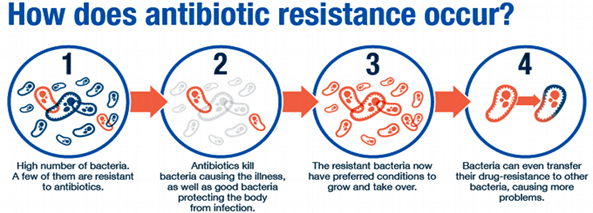

Context
In a Report by the Centre for Science and Environment (CSE) to mark World Antimicrobial Awareness Week (WAAW) has mentioned that Antimicrobial resistance (AMR) is a ‘silent pandemic’ and is a global public health threat.
- Centre for Science and Environment (CSE) is also going to promote Ethnoveterinary medicine (EVM) for treating animals.
|
Ethnoveterinary medicine (EVM) involves the use of traditional / herbal preparations in treating diseases of cattle. |
|
World Antimicrobial Awareness Week (WAAW):
|
Key Points:
- Increasing use of antibiotics and infectious diseases are becoming difficult to treat.
- According to a study, some 4.95 million deaths were associated with, and 1.95 million deaths directly attributable to bacterial AMR across the world in 2019.
- Apart from health, AMR is also likely to heavily impact livelihood and economies.
What is Antimicrobial Resistance?
- Antimicrobial Resistance is the resistance acquired by any microorganism (bacteria, viruses, fungi, parasite, etc.) against antimicrobial drugs that are used to treat infections.
|
World Health Organisation (WHO) has identified AMR as one of the top ten threats to global health. |
Factors Responsible:
- Antibiotic consumption in humans
- Access to antibiotics without prescription
- Lack of knowledge about when to use antibiotics
- Steroidal injection to Animals
- Anti-microbial drugs to animals
- Untreated disposal of sewage water bodies

Recent Government Initiatives:
- National Programme on AMR containment: Launched in 2012. Under this programme, AMR Surveillance Network has been strengthened by establishing labs in State Medical College.
- National Action Plan on AMR: It focuses on One Health approach and was launched in April 2017 with the aim of involving various stakeholder ministries/departments.
- AMR Surveillance and Research Network (AMRSN): It was launched in 2013, to generate evidence and capture trends and patterns of drug resistant infections in the country.
- AMR Research & International Collaboration: Indian Council of Medical Research (ICMR) has taken initiatives to develop new drugs /medicines through international collaborations in order to strengthen medical research in AMR.
- Antibiotic Stewardship Program: ICMR has initiated Antibiotic Stewardship Program (AMSP) on a pilot project across India to control misuse and overuse of antibiotics in hospital wards and ICUs.
- DCGI had banned 40 Fixed Dose Combinations (FDCs) which were found inappropriate.


